Technology and Business
Belief
Studying Computing/Computer Applications (CPA) goes beyond syntax or block programming in XMS. As an extension to MAKERS@Xinmin, we offer our students Computing as a GCE-O Level Subject/G3 level and Computer Applications as a GCE-N Level subject/G1 level.
Computing/CPA will foster in our students the necessary digital literacies, whilst enhancing their problem-solving abilities through computational thinking. Based on the Computer Education Framework (MOE), students are instilled with many concepts that will inculcate in them the necessary 21CC through the different lesson designs.
Through various online platforms, students will become adaptable and proficient in many digital tools that can later be applied in different fields. This not only opens up diverse career opportunities but also instills ethical awareness. With extensive hands-on experience, our students will enjoy applying their newfound skills through many challenges and competitions.
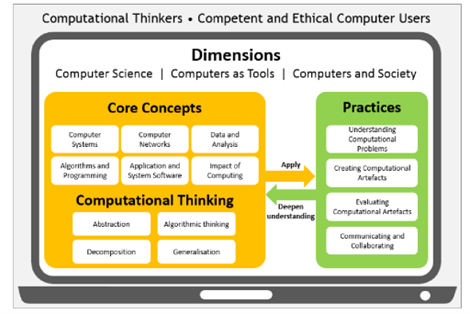
Computing/Computer Applications (CPA)
Through the Computing/CPA syllabus, students will achieve the following
objectives:
-
Attain proficiency in utilizing a diverse range of computer application software or use programming solutions and hardware to complete tasks and convey ideas effectively.
-
Gain an understanding of the ethical, legal, and security considerations associated with the utilization of computers and information and communication technology (ICT) within society.
-
Recognize the broader societal and individual impacts of ICT, acknowledging how it influences people and communities.
-
Cultivate fundamental computational thinking and problem-solving abilities, fostering their capacity to tackle various challenges effectively.
For Computing, students will learn through the following modules:
-
Data & Information – Excel and Number Systems
-
Systems & Communication – Network Design
-
Abstraction and Algorithm – Refinement and Analysis
-
Programing using Python - Program Development
For Computer Applications:, students will learn through the following modules:
-
Block-based Coding through Scratch
-
Digital Drawing through Inkscape
-
Microsoft Office –Powerpoint, Excel and Word
Pedagogical Approach
In XMS, active learning by students is encouraged. There is a variety
of hands-on activities, projects, and problem-solving exercises.
-
Coding assignments and debugging tasks are carried out using Google Colab.
-
Lesson resources through Google Classroom/SLS with hybrid learning modes to promote self-directedness.
-
Enhancing problem-solving ability coupled with computational thinking to real world context through newspaper clips. Students are to sieve the gist of the news and reflect how technology can help to solve an inconvenience etc.
-
They are then encouraged through their mini project to break down complex problems into smaller, manageable components and design algorithms to solve them. This applies into their Scratch or Python program.
-
Collaborative Learning: Promote collaboration among students through pair programming, group discussions, and peer code reviews. Collaboration can help students learn from each other and improve their communication skills.
-
Assessment and Feedback: Use a variety of assessment methods and test cases that will inform the student on the quality of their coding.
-
Variety of online Kahoot quizzes and mini-games.
-
Coding assignments that have peer evaluations, to gauge student understanding and promote critique..-
-
Reflection component after every extension activity : Encourage students to reflect on their learning experiences, the challenges they faced, and how they can apply what they've learned in their future endeavors.
Talent Development
GCE-O Level Computing
Mini Projects (Pygame) are open-ended tasks carried out as part of Secondary
3 curriculum over 8 weeks. The project will be based on authentic tasks
founded on real-world problems. There are 2 proposed implementations for
the Mini Project, either hardware-based or software-based. Students can
choose to use either Halocode/Microbit microcontroller to create contraptions
as a solution prototype to an identified problem in the community. Past
projects include Recycling Shower for Toilet Flushes and Medicine boxes
to remind Elderly. Students may also choose to use Unity or Pygame to create
a gaming project that has NE themes.
Other Competitions
-
TP x VJC Data Science Hackathon
-
Ngee Ann - Youth Cyber Exploration Program
-
SIT-VJC Project Inspire Program
-
DrCT/Bebras- Organised by SIMCC
-
ORION X: Decrypted Ngee Ann Polytechnic's School of InfoComm Technology (ICT)
-
National Software Competition 2023
GCE-N Level Computer Applications
Our students have been participating in the Animation and Game Making
(AGM) Competition organised by the Computer Education Unit under MOE since
2018. The objective of this competition is to create a platform for students
to exhibit their work, stimulate their enthusiasm for media and game design
and enhance their research abilities. Congratulations to our year’s GOLD
award winner 2023.
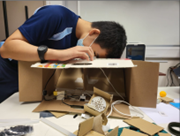
|
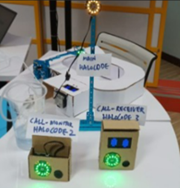
|
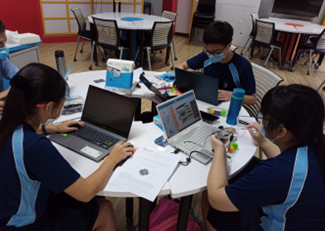
|
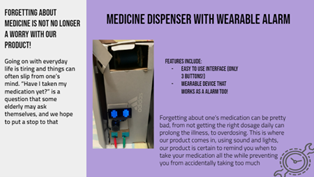
|
Elements of Business Skills
The Technology & Business Department oversees Elements of Business Skills (EBS), which is offered as an elective subject during Secondary 3 for the Normal (Technical) course. The curriculum is designed to introduce students to key business concepts, with a particular emphasis on basic marketing and customer relations, all while considering the Singaporean context. Besides offering students an opportunity to acquire fundamental business knowledge and develop versatile employability skills, the program exposes them to three distinct service sectors: Travel and Tourism, Hospitality, and Retail industries. Additionally, the acquisition of 21st-century skills through this program will not only benefit their current academic pursuits and employment but also prepare them for success in future educational endeavors and professional careers.
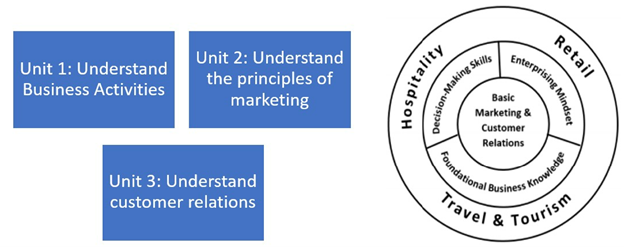
Our Pedagogical Approach
In XMS , students engage in a diverse range of learning activities, including
Learning Journeys, workshops, and competitions. These activities are meticulously
designed to enrich their educational journey and expand the practical application
of their knowledge. The primary goal is to empower students to develop
21st-century skills, particularly in the domains of information literacy
and global awareness.
The classes within this program seamlessly blend both online and offline components. Students are proficient in utilizing online platforms such as Classpoint, SLS, and Google Classroom to express their ideas and collaborate. Furthermore, they gain practical experience through hands-on activities like creating marketing pamphlets and participating in mini-games. These activities serve as integral aspects of their assessments, allowing them to apply their conceptual and evaluative skills effectively.
An essential element of the program occurs in Secondary 4, where students are tasked with demonstrating their decision-making and information literacy prowess by curating sourced information. In Secondary 3, students have the opportunity to conduct research, assess information, and provide well-founded recommendations for improving various business aspects, focusing on a business they identify themselves. Additionally, a one-day learning journey involves simple interviews and visits to nearby malls for data collection and ground survey reports. Through these experiences, students gain exposure to current trends and innovations in the Singaporean business landscape, enhancing their understanding of the challenges local businesses encounter.
Variety of Learning Activities
-
Use of digital and board games
-
Mind-mapping of Key ideas through Journalling
-
Observe-think-share on case studies
-
Role-play in Scenarios
-
Practice of Assessment for Learning through SLS & Google Classroom
-
In-Class immediate formative feedback through Classpoint
-
Usage of Differentiated Instructions (DI)
Our Approach to Talent Development
-
Participation in competitions and learning workshops by external Organisations
-
Student Entrepreneurship Program
-
EBS Amazing Race
-
ITE-Ignite Competition
-
EBS Digital Tic-Tac-Toe Competition 2023
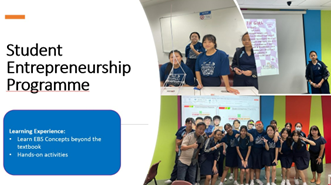
|
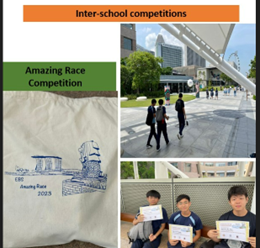
|

